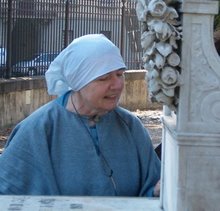
Terence was a freed slave from Africa, his full name Terentius Publius Afer, who wrote the most wonderful plays in which women, slaves and sons come out on top, in such pure Latin that he gave Cicero the concept of 'Humanitas', our 'Humanities'. The above line, meaning 'I am a man; therefore I consider nothing of humankind alien to me', was placed by Montaigne on his study ceiling in Bordeaux. I have placed an essay on the playwright, http://www.umilta.net/GodsPlenty.html, on the web site on Terence, http://www.umilta.net/terence.html. Look also at http://www.umilta.net/tormentors.html which gives the Latin text of his Heautontimuremos with miniatures and woodblock engravings of the scenes, as well as medieval plays written by women and men influenced by him.

Terence's Theatre
This is fitting for this library in a cemetery where we have a black slave from Nubia, Nadezhda, who came to Florence at 14, being baptized in a Russian Orthodox family, and also, with hers, the tombs of Elizabeth Barrett Browning, Frances Trollope, Richard Hildreth, Hiram Powers, who wrote and sculpted against slavery.
Even our Roma, who restore this Cemetery, were slaves from the Middle Ages to the nineteenth century, only being freed when Harriet Beecher Stowe's Uncle Tom's Cabin was translated into Romanian. And she was copying the anti-slavery novels already published by Frances Trollope, Jonathan Jefferson Whitelaw, and Richard Hidlreth, The White Slave.

A slave village (Shatra) in Romania, 1850s
We no longer need to sign the UNESCO Petition which has been delivered to Paris for the UNESCO Memory of the World Register's nomination. But we would appreciate any donation for the restoration and maintenance of this beautiful place, so filled with the world's memories. In particular are sought donations towards our alphabetization school for our skilled, but illiterate, Roma workers.




